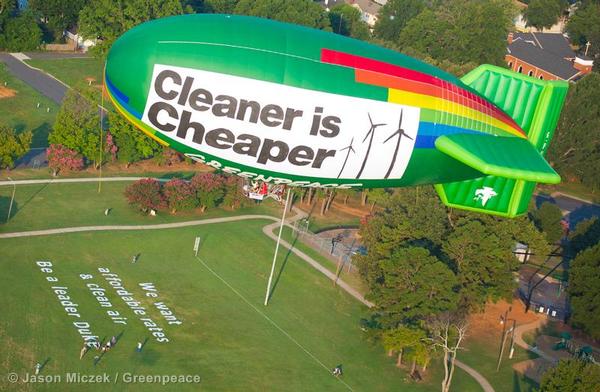Photo credit Justin Ruckman
It would be an impressive moment when a leader of the nations largest utility calls for the transformation of his industry. Only catch is, he has less than two weeks left on the job.
Last week, Duke Energy chairman Jim Rogers accepted an award from a utility trade magazine as the most influential person in the electricity business. It was one of several recent honors that have amounted to a sort of industry canonization of Rogers as his last work day approaches. Rogers retired as Dukes CEO in July, and his term as chairman ends this year.
In his keynote speech, Rogers articulated what many analysts consider the biggest challenge to utilities going forward. From a report of his speech:
In Rogers’ view, the industry is shifting from an integrated generator, transmitter and distributor of electricity, to an industry whose main purpose is to “optimize the use of electricity on the grid. New technologies, micro grids, severe storms and cyber security are transforming utilities’ primary role into the builders and maintainers of a resilient grid.”
Translation: The regulated monopolies that have dominated the utility sector for so long must now adjust their business model in the face of new technology – in particular, distributed solar panels.
For a century, utilities have made their money by building, running, and maintaining power plants and power lines. Each utility was the sole operator of its service territory, a regulated monopoly beholden only to a public utilities commission that – at least in theory – would act as a check on what power companies could charge for electricity.
Enter distributed solar. Instead of paying a monopoly for electricity and hoping that regulators control prices, customers take their energy into their own hands. They install solar panels on their roofs or properties, while staying connected to the grid for back-up. Many of the nations largest companies, including Apple and Walmart, are also adding solar to their operations.
For utilities, that could mean getting out of the electricity-making business and focusing on distributing power through their power lines – what Rogers meant by transforming utilities’ primary role into the builders and maintainers of a resilient grid.
Wise words from the most influential person in electricity. But also highly ironic. For one, its not the first time Rogers has expounded on the need for such a transformation. Its a spiel Rogers has repeated over and over for a decade, years before the current rise in solar.
But more importantly, Rogers has failed to act on those words. If anything, he has topped off a 30-year career by seeing through more of the same: massive, centralized power plants with huge costs that regulators inevitably pass onto customers.
These include the $1.8-billion revitalization of Cliffside Steam Station in North Carolina, a coal plant dating back to 1939, at a time when hundreds of coal boilers are being shut down nationwide.
Perhaps the lowest point in Rogers career centered around Edwardsport, a coal plant in Indiana. Hailed by Duke as one of the cleanest and most efficient coal-fired power plants in the world, Edwardsport quickly turned into a money pit. Its original cost estimate of $1.3 to 1.6 billion ballooned to $3.5 billion, forcing Rogers to appear before the states utility commission. Yes, [Edwardsport is] expensive, Rogers told regulators. But it will be the cleanest plant in Indiana.
And Rogers has continued to advocate for nuclear plants, the most massive, centralized and uneconomical power sources of all.
No wonder Duke honored its outgoing leader by renaming Cliffside the James E. Rogers Energy Complex.
Rogers replacement, CEO Lynn Good, has already professed to believe in the need for the same transformation as Rogers. We continue to have great opportunities to invest, whether its renewables or our grid, Good told Bloomberg this week. Those will be the opportunities that drive growth over time.
Heres hoping that Good will walk the walk where her predecessor only talked.




